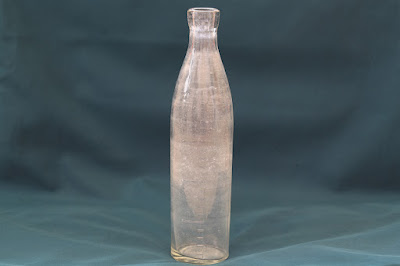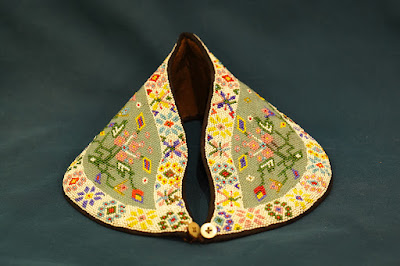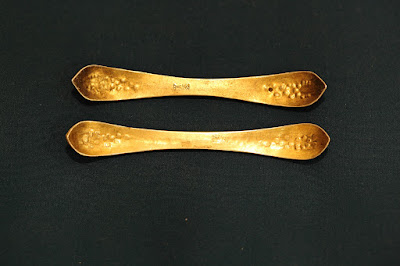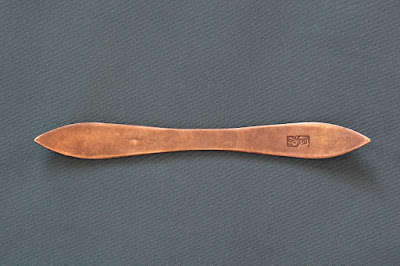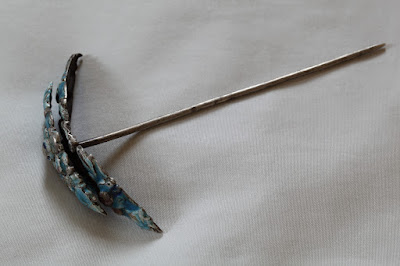The use of Batik is an integral part of Malay culture. Mostly, the Malay women in olden times wear their kebayas with Batik sarungs. Batik is a wax resist dyeing technique used on textiles. Melted wax is applied before the fabric is dipped in dye water.
Pictures below show the sample of Batik cap or chop from my collection, which is made of moulded copper. It shows the motif of flower and leafs. The chop will be dipped in molten wax, and then chopped or printed onto the fabrics to make the resist, before the fabric is dyed. The cloth it produces is called Batik cap. There's another method of making Batik uses hand-drawn techniques instead of cap. This method produces Batik which is called Batik Lukis (Hand-drawn Batik).
Sunday, March 27, 2011
Milk Bottles
Here are the vintage milk bottles from my collection. The glass milk bottle is originally from Europe and it shows how the Asian did not reject foreign cultural influences. In many cases, they would embrace these foreign influences, and make it their own.
Perfumes And Eau De Cologne Bottles
These three old scent bottles were bought from a Nyonya's family. Like women all over the world, Nyonyas also liked to scent themselves with all types of perfumes and eau de cologne. A popular scent used was Florida water, recommended since Victorian times and Ausonia brand from Roger and Gallet, as suitable toilet water for both men and women. These scented waters were useful in the hot tropical climates and most of these brands are still available today and have a retro appeal for some.
 Ausonia brand (1905) from Roger And Gallet, Paris.
Ausonia brand (1905) from Roger And Gallet, Paris.
Height : 11cm
Roger and Gallet are a firm of French perfumers which was founded by merchant Charles Armand Roger and banker Charles Martial Gallet in 1862. They started by buying a Parisian eau de cologne business which had been founded in 1806 by a member of the Farina family and then won a legal dispute over the right to use the family name. They specialised in toilet soap which was produced in a large factory near Paris. Later in the 19th century, they were successful with the newly synthesised fragrance of violet, for which they had the French rights, producing perfumes such as Vera Violetta.
 Nyonya Chinta, Yardley, 8 New Bond Street, London.
Nyonya Chinta, Yardley, 8 New Bond Street, London.
Height : 10.5cm
Yardley of London is one of the oldest cosmetics, perfume and toiletry companies in the world. Established in 1770, Yardley was a major producer of soap and perfumery. Due to the growing popularity of Yardley soaps and cosmetics at the turn of the 20th century, the company opened a shop in 1910 on Bond Street in London. The original Yardley shop on Bond Street was at 8 New Bond Street, but it later moved to 33 Old Bond Street.
 Ausonia brand (1905) from Roger And Gallet, Paris.
Ausonia brand (1905) from Roger And Gallet, Paris. Height : 11cm
Roger and Gallet are a firm of French perfumers which was founded by merchant Charles Armand Roger and banker Charles Martial Gallet in 1862. They started by buying a Parisian eau de cologne business which had been founded in 1806 by a member of the Farina family and then won a legal dispute over the right to use the family name. They specialised in toilet soap which was produced in a large factory near Paris. Later in the 19th century, they were successful with the newly synthesised fragrance of violet, for which they had the French rights, producing perfumes such as Vera Violetta.
 Nyonya Chinta, Yardley, 8 New Bond Street, London.
Nyonya Chinta, Yardley, 8 New Bond Street, London.Height : 10.5cm
Yardley of London is one of the oldest cosmetics, perfume and toiletry companies in the world. Established in 1770, Yardley was a major producer of soap and perfumery. Due to the growing popularity of Yardley soaps and cosmetics at the turn of the 20th century, the company opened a shop in 1910 on Bond Street in London. The original Yardley shop on Bond Street was at 8 New Bond Street, but it later moved to 33 Old Bond Street.
Late Ming Transitional Period Cup 1610-40
This blue and white cup is from late Ming Transitional period 1610-40.
Diameter: 6cm
Height: 3.5cm
Diameter: 6cm
Height: 3.5cm
Friday, March 18, 2011
Chinese Noble Lady Bead Work Head Gear
These are from Qing Dynasty or Republic era (Pre-1910s or earlier) Chinese bead work head gears / head pieces used by the noble Chinese ladies in olden time in the Chinese tradition. It is exactly like those portrayed in the old classic Chinese paintings in the courtyard, where you can see the ladies are wearing it and carrying a Chinese walking stick. The head gears are made with tiny glass beads and very much intact with colourful flora and fauna patterns.
Wednesday, March 16, 2011
Silver Betel / Tobacco Box
These two small and unique silver tobacco or betel boxes are believed to be original from Sumatra, Indonesia (19th century). They are delicately chased over the hinged lid and sides with typically Islamic Malay flower and foliage motifs. They are also attached by means of a multi-strand silver chain to a small spherical silver lime box which contains remnants of lime powder and which has a prominent cast silver catch.
Also check out the "Spittoons", the "Betel Nut Paraphernalia", the "Asam Gelugor Fruit-Shaped Brass Container" and the "Indonesian Betel Or Tobacco Box".
Cucuk Sanggul (1)
Cucuk sanggul is one of the important accessories for the hair. Usually, Nyonyas will keep their hair up to waist length. The hair would then be tied up into a bun, secured by hairpins, and some decorated with flowers. Nyonyas from Malacca and Singapore wore their hair buns or sanggul normally with three, five or seven hairpins, each in graduating lengths, called the cucuk sanggul.
Other variations of a set of seven Portuguese brass hairpins from Malacca.
 Picture 1 - Length of the hairpins from left to right: 13cm, 12.5cm, 11.5cm, 10.5cm, 10cm, 9.5cm and 7.5cm.
Picture 1 - Length of the hairpins from left to right: 13cm, 12.5cm, 11.5cm, 10.5cm, 10cm, 9.5cm and 7.5cm.
A set of five Nyonya silver hairpins from Penang.
An incomplete set of four Nyonya silver hairpins (instead of five) from Penang.
Another variation of a set of five Nyonya silver hairpins from Singapore.
 Picture 1
Picture 1
-Front-
A very unique set of silver gilt cucuk sanggul.
Length of the hairpins from left to right: 9cm, 10.5cm and 9.5cm.
 Picture 1
Picture 1
-Front-
This small cucuk sanggul (made of brass) is almost similar to the three above.
Length: 4cm.
 Picture 1
Picture 1
Another type of old hair accessory used by Malay ladies. This silver hair clip has two functions to tie the hair.
Length: 12cm.
Also check on "Cucuk Sanggul (2)".
Other variations of a set of seven Portuguese brass hairpins from Malacca.
 Picture 1 - Length of the hairpins from left to right: 13cm, 12.5cm, 11.5cm, 10.5cm, 10cm, 9.5cm and 7.5cm.
Picture 1 - Length of the hairpins from left to right: 13cm, 12.5cm, 11.5cm, 10.5cm, 10cm, 9.5cm and 7.5cm.A set of five Nyonya silver hairpins from Penang.
An incomplete set of four Nyonya silver hairpins (instead of five) from Penang.
Another variation of a set of five Nyonya silver hairpins from Singapore.
 Picture 1
Picture 1-Front-
A very unique set of silver gilt cucuk sanggul.
Length of the hairpins from left to right: 9cm, 10.5cm and 9.5cm.
 Picture 1
Picture 1-Front-
This small cucuk sanggul (made of brass) is almost similar to the three above.
Length: 4cm.
 Picture 1
Picture 1Another type of old hair accessory used by Malay ladies. This silver hair clip has two functions to tie the hair.
Length: 12cm.
Also check on "Cucuk Sanggul (2)".
Subscribe to:
Comments (Atom)











